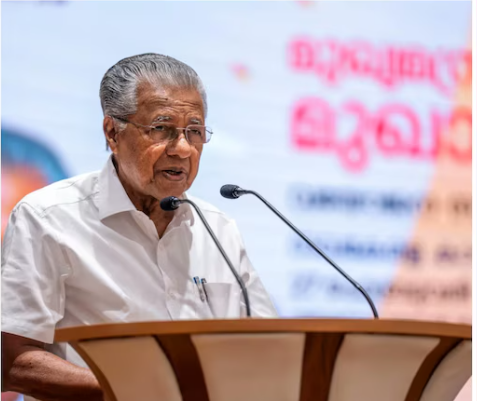The Lok Sabha (LS) elections of Indian
Introduction: A. Overview of the significance of LS elections in Indian politics. Introduction to Pinayari’s assertion regarding the referendum on secularism. Outline of the article’s approach to examining this assertion.
Understanding Secularism in India: A. Historical roots of secularism in India’s freedom struggle. Constitutional provisions and the concept of secularism in the Indian context. Evolution of secularism as a guiding principle in Indian governance.
. Analysis of past elections and their implications for secularism. Role of political parties in shaping the discourse on secularism during elections. Voter attitudes and perceptions regarding secularism in the electoral context.
Pinayari’s Perspective on LS Polls and Secularism: A. Examination of Pinayari’s arguments regarding the referendum on secularism. Analysis of the factors driving Pinayari’s assertion. Critique and evaluation of the validity of Pinayari’s perspective.
V. Societal Dynamics and Secularism: A. Impact of social diversity and pluralism on the practice of secularism. Role of civil society and grassroots movements in promoting secular values. Challenges and opportunities for fostering secularism in contemporary India.
Electoral Politics and Identity: A. Exploration of identity-based politics and its relationship with secularism. Intersectionality of religion, caste, and ethnicity in electoral mobilization. Implications for secular governance and national unity. 
Governance and Secular Principles: A. Examination of policies and governance frameworks that uphold secular ideals. Challenges to secular governance and the role of state institutions. Strategies for safeguarding secularism in governance and policy formulation.
Conclusion: A. Summary of key insights and findings from the analysis. B. Reflections on the interplay between LS polls, secularism, and Indian democracy.
Recommendations: A. Policy recommendations for promoting secularism in electoral politics and governance. B. Suggestions for fostering inclusive and pluralistic narratives in public discourse. References: A. Citations and sources used in the article. Additional readings for further exploration of the topic. Acknowledgment of sources and contributions.
for more information click on this link
-
LS Polls Historical Context of Secularism in India:
Discuss the evolution of secularism in India, tracing its roots back to the freedom struggle and the ideals of pluralism advocated by leaders like Mahatma Gandhi and Jawaharlal Nehru.Explore how secularism was enshrined in the Indian Constitution, particularly through the principles of equality, freedom of religion, and non-discrimination.Analyze landmark events in Indian history that have shaped the discourse on secularism, such as the partition of British India and the subsequent challenges of communalism.
- Contemporary Political Landscape:Examine the role of political parties in shaping the discourse on secularism during elections. This could involve analyzing party manifestos, campaign rhetoric, and alliances formed based on secular or communal agendas.Investigate how issues such as religious identity, minority rights, and communal violence are politicized during election campaigns.Highlight instances where the secular fabric of Indian democracy has been tested, including controversies over religious conversions, cow vigilantism, and the Uniform Civil Code.
- Public Perception and Voter Behavior:Conduct surveys or analyze existing data to understand voter attitudes towards secularism and its importance in electoral decision-making.Explore how socio-economic factors, educational background, and regional differences influence voter perceptions of secularism.Investigate the role of social media and digital platforms in shaping public discourse on secularism and identity politics during election cycles.
- International Comparisons and Case Studies:Compare India’s approach to secularism with that of other democratic nations facing similar challenges of religious diversity and communal tensions.Study case studies of countries where religious identity plays a significant role in electoral politics and governance, drawing parallels and lessons for India.
- Policy Implications and Reform Proposals:Propose policy recommendations aimed at strengthening secularism in India’s electoral processes and governance structures. This could involve electoral reforms, legislative measures, and public awareness campaigns.Advocate for interfaith dialogue, community outreach programs, and initiatives to promote religious tolerance and social harmony.Highlight successful examples of secular governance at the state and local levels, showcasing best practices and lessons learned.




